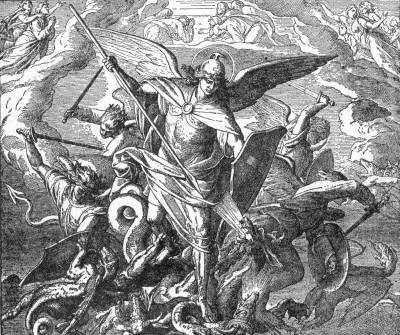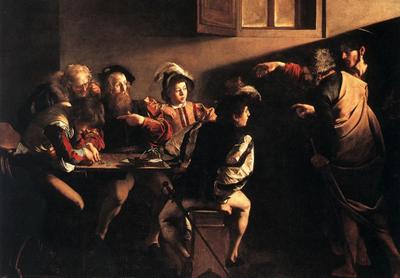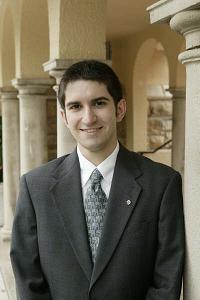Welcome to this week's Christian Carnival!I am honored to be the host. My sincerest thanks to Dory and to all who submitted posts this week. My apologies for the delay and the lack of a brilliant theme on my part. Please let me know if there are any problems.*******"The Liturgy of the Hours' readings last week and this week are the Prophet Ezechiel on rotten shepherds and St. Augustine of Hippo's sermon 'On Pastors' - about all the ways that pastors can foul up. But
Karen Marie is very much convinced that the sermon we direly need to read is '
On the Putative Faithful'. We are already very efficient at judging our pastors, but what about ourselves, the parishioners?"
In
"Augustine and the Trinity", Henry Imler of
The Unsound Argument relates that "Augustine sought to dispel heretical formulations of the Trinity and tried to show how each member of the Trinity have the same essential natures and how the Trinity was a necessary configuration of God. He did this in an interesting manner."
*******In
"Be Obedient",
Chasing the Wind asks "How can you obey the rules if you don't know what the rules are? God's Word is living and active and He wants you to be obedient."
"'Did any people ever hear the voice of a god speaking out of the midst of the fire, as you have heard, and still live?' (Dt 4:33)
Hammertime presents how a God who, unlike other gods, speaks & reveals himself to us in
'Revelation, General and Specific.'"
In
"Sola Scripture Conference - what I learned",
Random Thoughts writes about "How to get the most out of your bible. This conference had it all!"
In
"Asking Questions of a Biblical Text",
Participatory Bible Study Blog observes that "Some very basic questions can lead you to new meaning in a familiar Bible text. Using the initial announcement of the flood (Genesis 6:5-8), this post looks at what we can learn from this short, familiar text"
"Michele of
Life Under the Sun begins a study of the
'book of Revelation'."
Ending with quotes from Scripture,
Tidbits And Treasures observes that "Things have changed over the years, and politeness, manners, and respect has taken the back seat and '
anything goes', it seems."
In
"The First Fantasy of the Bible", Adam Graham of
The Lost Genre finds a place for Christian fiction writers.
In
"Slavery, Morality and Counter-Culturalism", the blog
...in the outer... observes that "reflections on the use of the term bond-servant in the NT leads to some surprising tentative conclusion about church, and its relation to society, which suggests that the notion of the church being a counter-cultural force may not be as strong as often suggested."
In
"Idolatry and Isaiah 40-66",
Parableman holds that "the focus on idolatry in several places in Isaiah 40-66 counts against the view that these chapters were written by other people much later than Isaiah's lifetime during the exile and beyond."
With
"What is blasphemy?" Imago Dei observes that "a lot of Christians are confused about what blasphemy really is, but the Bible gives a clear definition."
*******In
"Mob Mentality",
LeslieCarbone discusses reaction to the recent execution of three Christians in Indonesia.
With
"Tortured",
Romans 15:4 Project has questions, noting that "Torture is a hot topic right now. What constitutes torture? Should we use it if it saves more innocent lives? Some don't even stop to ask, and the people they torture have done nothing other than confess a living faith in Jesus Christ, not murder or terrorist plots, just faith in Jesus. They are not given rights or trials."
With
"Brothers and Sisters in Christ, Not Political Parties",
Pursuing Holiness asks "Ever find yourself irritated at a fellow church member who holds an opposing political view?"
In
"Evolution is Great Theology!"(sic),
Thinking Christian observes that "Somehow, incredibly, the professional skeptic Michael Shermer got tapped by Scientific American to explain why Christians should be delighted to believe in Darwin. His understanding of Christianity is revealed to be very weak. But (see the end of the post) maybe it's not all his fault."
"Can you prove evolution using the Bible? Don Bosch follows up a lecture by Christian geneticist Dr. Francis Collins
with his own efforts to link DNA, evolution, and Scripture. This and lots of other eco-bloggy goodness at
The Evangelical Ecologist Blog this week."
*******JCHFleetguy from
Brain Cramps for God is doing a
"Journal (on) "'The Life You've Always Wanted'" at the blog Street Prophets.
In
"Bringing Fictional Characters to Life",
Sun and Shield "starts off with a book, in which bringing fictional characters to life is an integral part of the plot, and goes to bringing Jesus back to life."
"When you think of God's mercy and forgiveness, what movie comes to mind? This week at
Light Along the Journey John tells us
'what movie comes to his mind' and why."
In
"Songs that Matter, Part II: Rich Mullins",
DawnXianaMoon.com:Randomness says, "Two of Rich's songs are particularly special to me:
Hard to Get and
Hold Me Jesus. After growing up in church and taking it seriously for my entire life, I can usually give reasonable answers to theological questions--but sometimes life doesn't make sense, even after all the intellectualized mantras about trusting God and how God is love."
In
"Behind the Scenes Photos", Jan of the blog
The View From Her "has some connections, and shares some exclusive photos and information aboutthis new movie, based on Christian author Francine Rivers' best-selling book"
The Last Sin Eater.
"The discipline of propriety involves more than a modest appearance. It also includes our words. What comes out of our mouths says more about what is in our hearts than anything else."
"The Propriety of Our Words" "details insights gleaned from Barbara Hughes' book, Disciplines of a Godly Woman," and
Lux Venit's "own experience with gossip and other speech problems."
*******In
"Calvary Church's $100mil project",
Journal of Ruth comments that "a Malaysian church is planning to raise money to build a $100mil convention centre for "holistic" activities. All this in a country where some churches hold services from a shack and some pastors are living in poverty."
In "
If so, then what",
Technogypsy says, "I look at an atheists work and ask, if he is right, why should I care?" (Warning: strong language)
With
"Dissing Reason",
Pseudo-Polymath says, "I've been having an ongoing discussion about reason and related maters spurred on by Benedict's speech. In this essay, I consider reasons to not place reason on a pedastal."
In
"Faith and Conversion",
Fides et Veritas "explores a growing trend toward forced conversions and why we as Christians must resist the temptation to use such methods."
Steve Bishop of
An Accidental Blog looks at what he feels are
"Phrases Christians should avoid".
*******This sounds like an ad, but it really is a reflection on Scripture and good sense:
"The Secret to Defeating Debt" on the blog
Unleash Your Potential.
With
"4 Secrets to Time Management That Define You", Patricia of
a better you blog says, "Succeed in fulfilling God's purpose for your life with these four secrets to managing your time wisely."
In
"Money and Depression, and some stuff in between"...,
Where's the Auto Pilot? observes that "money spending is often used by most of us as a bandaid on a bigger problem. Feeding the habit of materialism will only continue the problem."
In
"Why Religion Matters",
Matt Hutter discusses "studies on the effects of religion related to stress-levels in life, the effects of religion on CEOs and how students handle stress while at college with religion."
*******At
Crossroads,
"Postmodernism: What is Truth?" "is the second in a series challenging elderly Christians to be proactive in bringing in younger adults since they seem to be missing in our churches. In the series I cover just what postmodern thinking is in understanding this younger generation. At the end of the post I give an assignment."
In
"Prayer: A Response and An Appeal",
truegrit is "Responding to another blogger's post caused me to take a closer look at the truth about prayer."
In
"Thinking for yourself",
A Penitent Blogger reflects briefly on our limitations and opportunities as human beings.
In
"Window On The World: Hospitality in Africa",
Lingamish has "reflections on busy American Christians and their interaction with overseas missionaries."
jamileigh.com shares "
What Charleigh has taught me about God."
*******
 A Penitent Blogger
A Penitent Blogger







 "As you consider your life and where it is leading, ask for God’s help in discovering what His purpose is for you. Consider these words from Scripture:
"As you consider your life and where it is leading, ask for God’s help in discovering what His purpose is for you. Consider these words from Scripture: